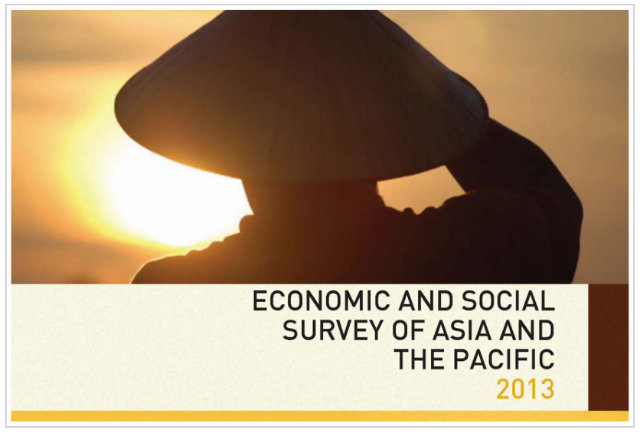SUMMARY
This is AI generated summarization, which may have errors. For context, always refer to the full article.

MANILA, Philippines – The Philippines’ economic growth is expected to ease to 6.2% in 2013, according to the United Nations Economic and Social Commission for Asia and the Pacific (ESCAP) on Thursday, April 18.
In its Economic and Social Survey of Asia and the Pacific 2013, the UN body said Philippines’ economic growth could be slower than the 6.6% growth posted in 2012 since the slowdown in major trading partners like China may impact the local economy.
However, ESCAP said domestic demand and government infrastructure spending will keep growth afloat. It noted that the government also intends to raise infrastructure spending to 5% of Gross Domestic Product (GDP) in 2016 from the 2% of GDP in 2012.
“Output growth is projected to remain high at 6.2% in 2013, driven by strong private consumption. Poor global demand, including a slowdown in major trading partners such as China, could impede economic expansion, however. Speedy growth could materialize if progress on the public-private partnership gains more momentum, helped by the upgrade of the country’s rating to investment grade status in March,” ESCAP said.
The ESCAP forecast comes on the heels of economic outlooks released by other multilateral agencies. The Asian Development Bank (ADB) and the International Monetary Fund (IMF) says the country’s economic growth will be at 6% in 2013 while the World Bank said growth will be above 6% in 2013 and 2014.
Jobs needed
Despite the expected uptick in the Philippine economy’s growth in 2013, the ESCAP noted that the government must find ways to increase the availability of decent jobs in the Philippines — a call that’s prevalent amid sustainability issues over the country’s high growth.
ESCAP said the country’s employment rate continued to grow, but at a slower pace of 1.3% in 2012, compared with 2.4% in 2011. However, informal employment as a share of non-agricultural employment remained high at 70.1%.
Decent jobs are also important in addressing inequality in the Philippines. The country’s Gini coefficient, a measure of inequality, has risen to 44.8 in 2009.
“The youth unemployment rate also stood at 17%, substantially higher than the average unemployment rate, and as many as one in four youth were neither in education nor employment. Higher job creation in the formal sector remains a key challenge for inclusive growth,” the ESCAP said.
To help boost jobs, ESCAP recommended that public investment must be between 5% and 8% of GDP for social protection and sustainable development policies.
These public investments include:
- a job guarantee programme
- a universal pension scheme
- disability benefits
- increased public health spending
- universal school enrolment
- universal access to modern sources of efficient energy
The ESCAP said this can be self-financed by most countries and external financial support for least developed countries, geographically disadvantaged nations, and small island developing states.
New normal?
The Philippines is not alone in seeing slower growth in 2013. The ESCAP said economic growth in Asia Pacific economies will slow due to external factors.
ESCAP cautioned that “much lower growth compared to recent years could become a new normal for many regional economies if present economic trends were to continue” and this could cause an estimated economic output loss of about $1.3 trillion by end-2017.
Long-term structural issues, such as rising inequality, energy and infrastructure shortages are compounding the regional slowdown and the Survey says the “structural solution to invigorating the domestic drivers of growth…will lie in making the development process more inclusive and sustainable”.
With the region home to nearly two-third of the world’s poor and having more than a billion people with insecure livelihoods, the Survey highlights the economic benefits of social protection.
ESCAP said this is the reason why economies must exert efforts to stimulate demand and sound macroeconomic policies to help promote broad-based and sustainable development.
“The 2013 Survey reminds us that this is no time for complacency, as the need for a more inclusive and sustainable pattern of economic and social development continues to be critical,” UN Under-Secretary-General and Executive Secretary of ESCAP, Dr. Noeleen Heyzer said.
“In the light of the region’s high degree of economic insecurity, large development and infrastructure gaps and heightened environmental fragility along with extreme exposure to climate change-related risks, it is necessary to better balance the stabilization and the developmental roles of macroeconomic policies,” she added. – Rappler.com
Add a comment
How does this make you feel?
There are no comments yet. Add your comment to start the conversation.